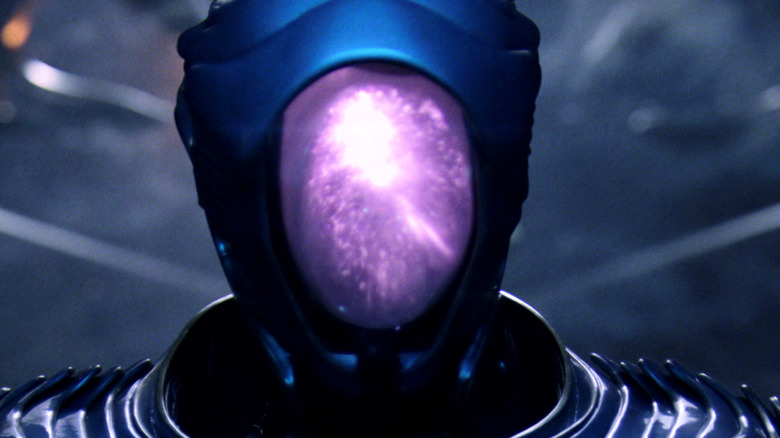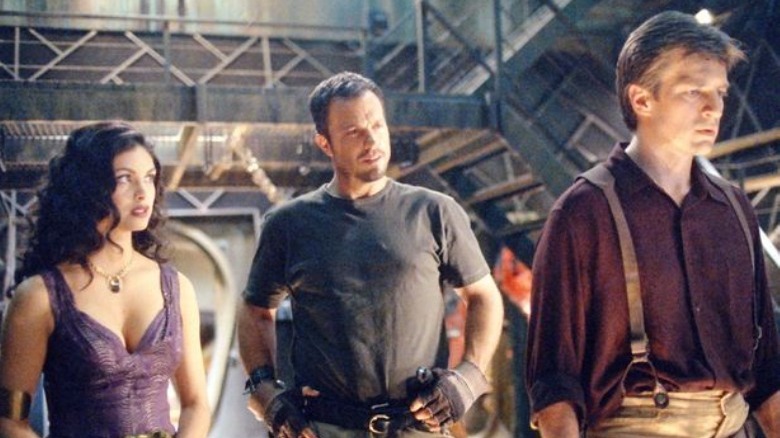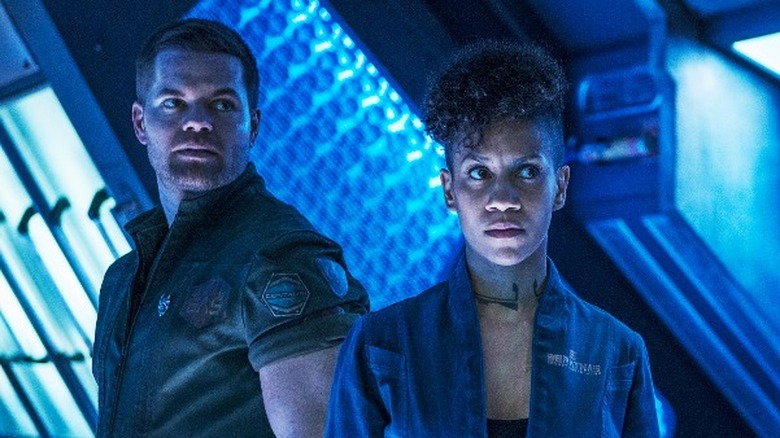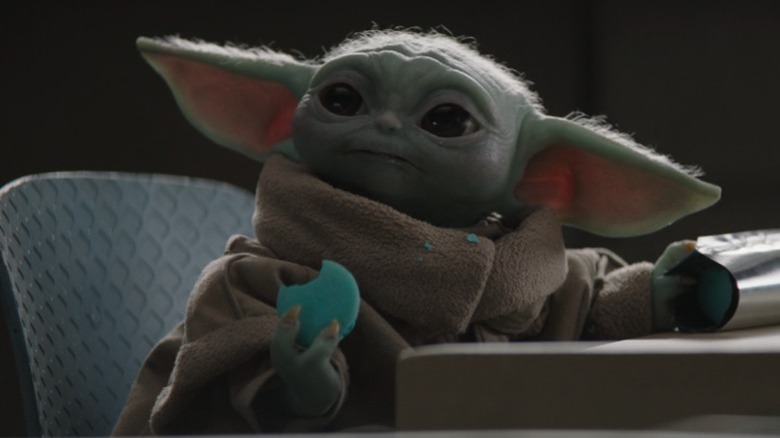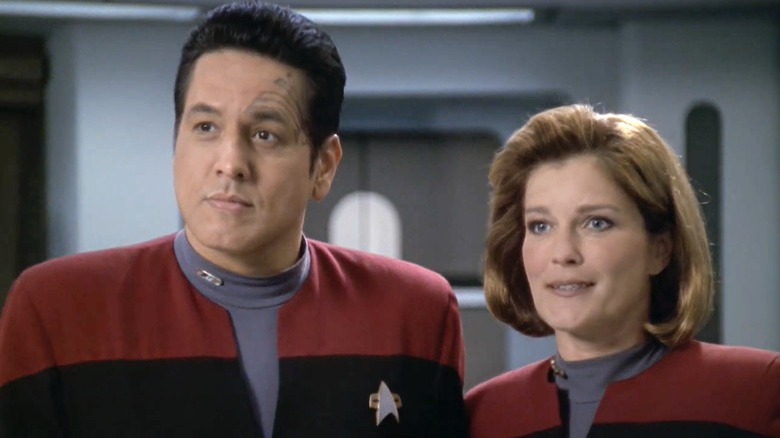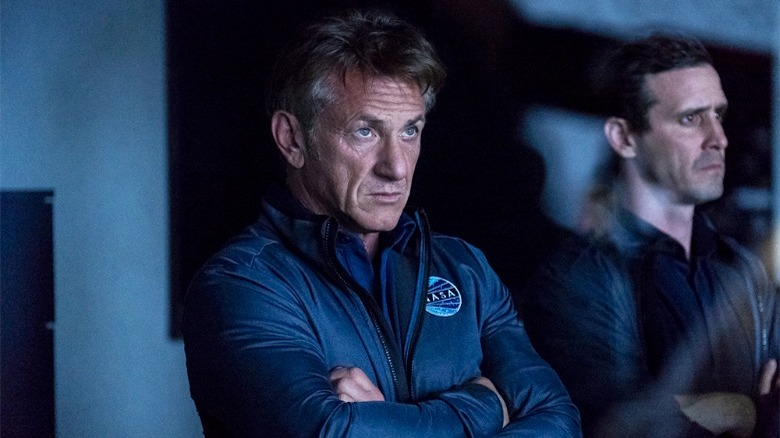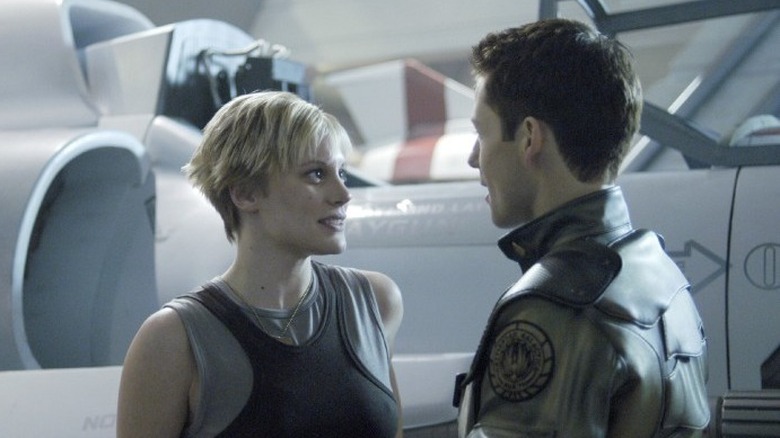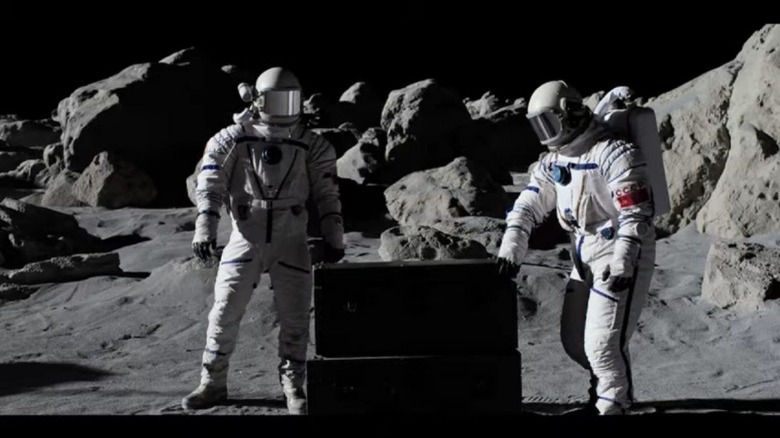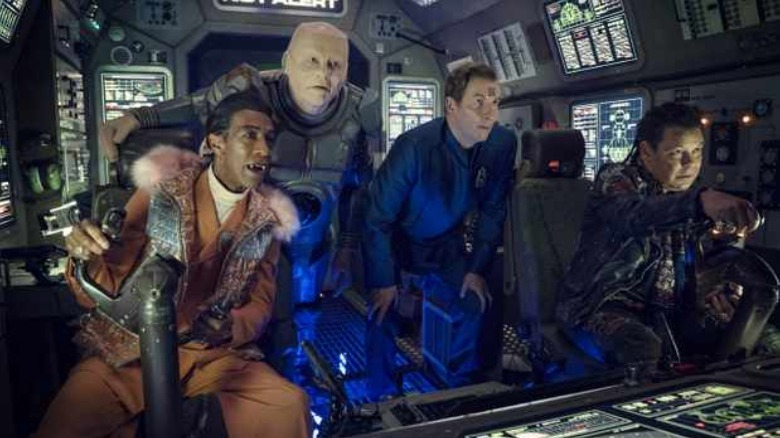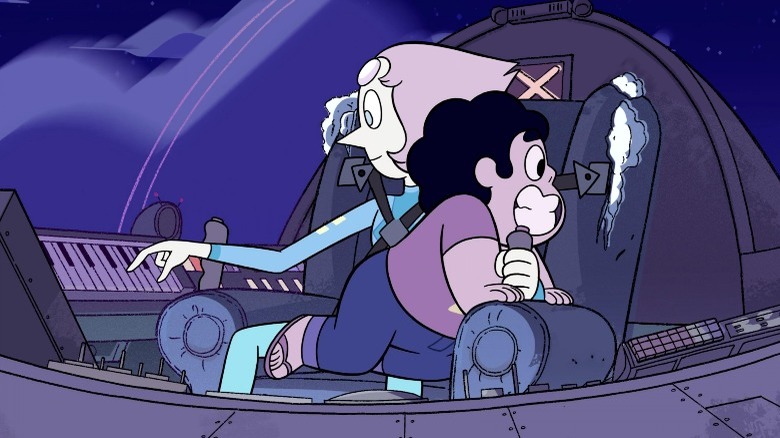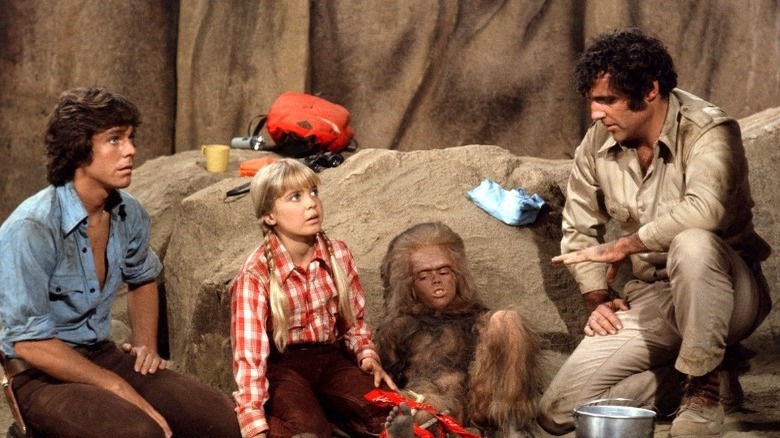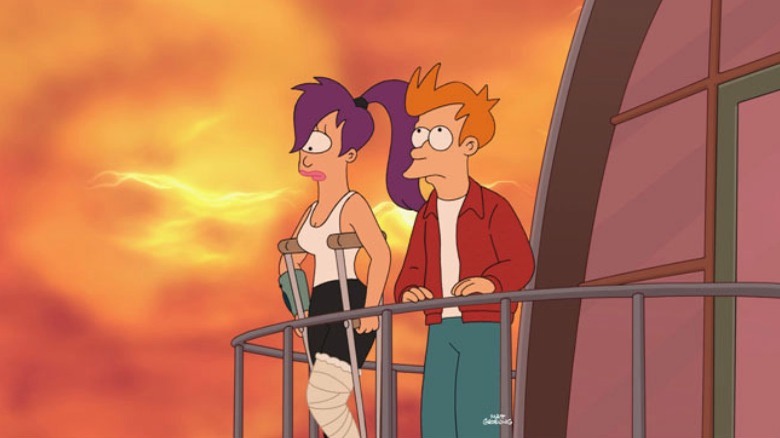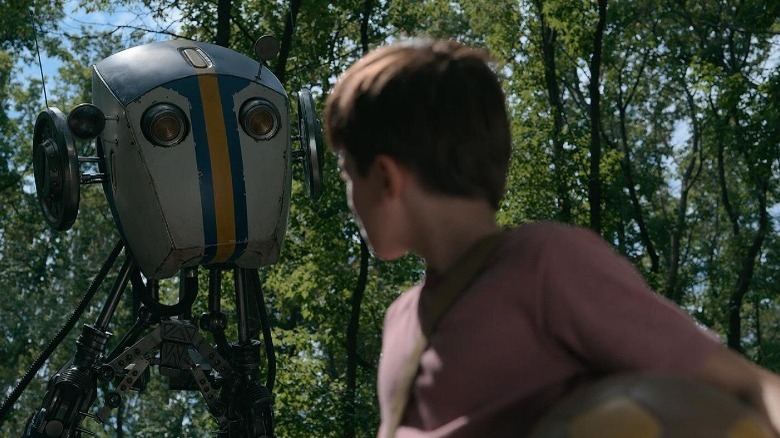Shows Like Lost In Space That Sci-Fi Fans Need To Watch
After a two-year hiatus, fans of the Netflix reboot of "Lost in Space" were undoubtedly relieved when its third and final season was finally released this month. Like many dystopian shows, "Lost in Space" gained new levels of cultural relevance and catharsis for viewers while between seasons: not only has the pandemic made the Robinson family's struggle for survival more relatable, but the creeping and inevitable effects of climate change have us all pondering a future where we perhaps attempt to colonize other planets. Much like the Robinsons, we're as beset by outside threats as we are by sabotage from within.
Of course, if you've found this article it's likely that you've binged the entire third season in one or two sittings. In addition to joy, sadness, and deeply-held opinions on what should have happened in the wake of the show ending, there's a Robinson family-sized hole in your heart and you're hungry for more adventures in space, more wayfaring travelers, more vastness and more of the unknown from the corners of the streaming content universe. Here are the shows like "Lost in Space" that every sci-fi fan needs to watch.
Firefly
You could consider the short-lived "Firefly" in many ways as a contemporary of "Lost in Space," since it's based on the same idea that "the earth was used up" and humanity would need to colonize other planets to survive. Centuries later, a massive collection of planets are all ruled over by a central government called "The Alliance," which had to quash a rebellion six years before the events of the show. The lead character is a resentful former soldier for the rebellion, who takes odd jobs and smuggles cargo to and from the rugged frontier planets.
Much like "Lost in Space," "Firefly" features a constant struggle just to survive as the crew of the Firefly-class transport ship Serenity have to stay out of trouble, ahead of the law, and pull just enough jobs to stay in space. Captain Malcolm Reynolds (Nathan Fillion) and his makeshift family of employees scramble to save one another from certain death just as frequently as the Robinsons, although the most frequent cause is a gunshot wound, since the majority of planets they visit are still in the early, "Wild West" phase of colonization. They never seem to encounter alien life forms or robots, but there are space-mad cannibals called "Reavers" that turn out to be central to the story of the spinoff movie, "Serenity."
The Expanse
What if, instead of heading all the way to Alpha Centauri (and kidnapping an alien robot to do so), we just stuck around in our own solar system and colonized the other planets we've got? This is the history of Amazon's critically-acclaimed "The Expanse." Mars has been colonized so long that it has its own government that's currently in a cold war with Earth's, while an underclass of "belters" that live out on the asteroid belt in mining colonies have been there so long they've started to evolve differently in zero-G.
Not only does "The Expanse" have five entire seasons and counting for your streaming pleasure, it begins as three shows in one. A detective tries to find a missing girl, a politician in the U.N. plays a complicated shell game, and the crew of a frigate ship get caught up in interplanetary war during the first season. Slowly these threads weave together into a bigger story that maintains all the density and complexity of James Corey's source series of novels. Eventually, humanity begins to colonize other systems after all. Season 6 of "The Expanse" premieres this month on Amazon Prime, so it's an ideal time to get caught up during your holiday break.
The Mandalorian
The most enduring image from "Lost in Space," whether it's the new show, the 1960s original, or the 1998 movie, is of youngest child Will Robinson and the robot. "Danger, Will Robinson!" is perhaps the only line from the original that the new version repeated. There's something appealing about a giant metal man protecting a small, helpless child, a formula that Disney's "The Mandalorian" perfected over two seasons as the title character watched over a young alien named Grogu, known to the world at large as Baby Yoda.
"The Mandalorian" is of course a "Star Wars" spinoff, so Jedi powers and the fallout from the events of "Return of the Jedi" intrude on the story from time to time. But for the most part, it's just a badass bounty hunter toting around an adorable little green guy, getting stranded on strange planets just like the Robinsons and trying to survive. The Mandalorian himself rarely takes his helmet off and puts up a tough front, but just like the implacable robots of every "Lost in Space" iteration, he's a sucker for an adorable face.
Star Trek: Voyager
The premise of the original "Star Trek" and the majority of the spinoffs isn't, on the face of it, terribly compelling: "To seek out new life and new civilizations. To boldly go where no man has gone before!" It sounds exciting, but in practice it usually leads to the crew interfering in the affairs of alien species that did nothing to deserve the interruption. Sure, you root for the crew of the Enterprise to make it through all of their various misadventures, but did they really need to be there in the first place?
"Star Trek: Voyager," on the other hand, is unique, as it begins with the titular ship transported 70,000 light years from Earth into the previously unexplored Delta Quadrant by a mysterious alien entity. In short, they're stranded just like the Robinsons on "Lost in Space." Instead of blundering into perfectly innocent civilizations or getting bogged down into the politics of "Deep Space Nine," "Voyager" is a tale of survival as the crew deals with isolation and dwindling resources while they look for a way home. If you're a fan of Molly Parker's commanding lead performance in "Lost in Space," "Voyager" is also notable for Kate Mulgrew's excellent portrayal of Captain Janeway, the first female captain in a "Star Trek" series.
The First
Watching "Lost in Space" while going through catastrophic global events of our own is eerie, especially when the show chronicles the fallout of the asteroid impact that's rendering the Earth uninhabitable in flashbacks — in one scene, two characters walk through smoke and ash into a store to do some Christmas shopping and casually hang their gas masks on a rack. One almost wishes the story devoted more time to the family's preparation for the colonization mission. They refer frequently to "stress training" and various other classes that members of the family had to take, but the action is so non-stop that there isn't much time to ponder what it does to one mentally to prepare to go to space.
"The First," a one-season drama on Hulu, is a fascinating dive into the psychology of astronauts from "House of Cards" creator Beau Willimon. When the first manned mission to Mars explodes on the launchpad, the astronauts in line for the next attempt have to decide whether or not to take a trip from which they might never come back. The highlight of the show is the relationship between Captain Tom Hagerty, played by a gloomy Sean Penn, and his daughter, as he contemplates leaving her behind while she's in the throes of addiction. How can he convince her to save her own life when he's willing to take chances with his own?
Battlestar Galactica
The 2004 reboot of "Battlestar: Galactica" is a space soap opera that butters its bread with the "Lost in Space" formula: take a group of characters, separate them from time to time and place them in mortal peril, and then reunite them and have them get all emotional because they were afraid the other person was dead. As a future civilization of 12 planets is nearly wiped out by the sentient machine Cylons, there's pretty much every permutation of fathers that thought they lost sons, former lovers that are thrown back together by circumstance, and so forth to tug at your heart strings.
Eventually the struggle for survival against the Cylons gets sort of bogged down by the search for a new planet. In the last season, as the spiritual underpinnings of the show's mythology took precedence, even the most ardent "Battlestar" fans would admit it botched the landing. But the show stands tall nearly 20 years later as one of the best sci-fi shows of this century. The show is also anchored by a terrific performance from Mary McDonnell, who much like Molly Parker of "Lost in Space," is a terrific character actress that suffered from a criminal lack of leading parts beforehand.
For All Mankind
Here's something "Lost in Space" doesn't really get into: generational trauma. The Robinsons' marriage was on the verge of collapse before they head to space, plus there's Judy's adoption and biological father to deal with. Even without the world ending and leaving for Alpha Centauri, you have to wonder what the Robinson children will be like when they grow up. One hopes they'll be the same pluckish problem solvers we've grown to love.
"For All Mankind," in just two seasons on Apple TV+, has covered multiple decades of storytelling and shown the effect that space travel has on multiple generations of the same families. Set in an alternate universe where the Russians got to the moon before the United States did and turbo-charged the space race, it's already flipped the calendar from 1969 to 1983, with a glimpse or two even further ahead. Characters are driven to divorce, some are alienated from their children, still others' children follow them into the astronaut business. It's a show that started out with a certain retro-cheesiness but has picked up as the time jumps allow it to evolve along with the characters.
Red Dwarf
The thing most shows about space tend to skip over is how fundamentally boring space travel would be. It would be mostly long, claustrophobic stretches of time with the same small group of people, really. You would get into petty fights and arguments and mostly just have to pass time — in fact, it would be rather like a workplace sitcom. There are occasional glimpses in "Lost in Space" of the small details of the Robinson family life, like in the opening scene when they play zero-G Go Fish with a deck of cards, but most of the show is action and adventure.
For the truly existential humdrum of space, try the long-running BBC sitcom "Red Dwarf." A low level technician on a mining vessel wakes up after three million years in cryo-sleep to find that he's the last human in existence. He fortunately has "people" to talk to, in the form of a hologram, an android, and a cat-person (descended from his pet cat in the past), and the rest of eternity to just kind of hang out. They find their share of misadventure of course, but the majority of this modestly-budgeted comedy takes place within the confines of the ship.
Steven Universe
One thing that sets "Lost in Space" apart is that it manages to balance the actual grim stakes of nearly dying in space a lot with a fundamental wholesomeness, or a sort of resolute positivity. It is as fantastical as the original series, but has a more modern warmth and humanity instead of the more cheesy '60s vibe. If you want a show that will take you further and make you cry actual tears, Cartoon Network's "Steven Universe" might actually be your best bet.
An '80s-inspired universe where galactic warriors called "Gems" protect the Earth from invasion, it tells the story of a half-human half-Gem named Steven that has a great destiny to fulfill. It's funny, beautifully drawn, and has the occasional musical number. It's purely entertaining for kids, while also telling a layered, fascinating story about family, identity, trauma, and many other things. By the time the story wraps up, somehow the bright colors and unexpected depth of empathy you feel for the characters makes you feel like Andy giving his toys away at the end of "Toy Story 3."
Land of the Lost
If you're more of a fan of the original "Lost in Space" vibe, you have to check out "Land of the Lost," which ran from 1974 to 1976 — nearly a decade after "Lost in Space" — on Saturday mornings on NBC, positioning it squarely as a children's show. It has the same energetic, kitschy vibe as its predecessor, but trades traveling through space for the exploration of alternate dimensions.
The Marshall family, trapped in a world already filled with multiple sentient forms of life as well as a seemingly endless supply of dinosaurs, try to find their way home like an inter-dimensional Swiss Family Robinson instead of spacefaring one. It's of course pretty fun to live now in the age of super-realistic and intricate CGI, but there's a certain undeniable charm to latex costumes, stop-motion dinosaurs, and hand puppets. "Land of the Lost" has that and family-friendly humor in spades.
Futurama
"Futurama" is essential viewing for any sci-fi fan, and built on the foundation of the colorful, zany aesthetic of the original "Lost in Space." The fourth episode of the show is even called "Love's Labours Lost in Space." Through multiple cancellations, movie continuations, revivals, and seven seasons overall, "Futurama" covered every imaginable sci-fi cliché and trope, and the employees of the Planet Express delivery company became like family to fans of the series.
Despite the program's irreverent tone, "Futurama" is famous for some legitimately compelling and highly emotional episodes about its characters, including one of the hands-down saddest episodes of television of all time. As the years go by, "Futurama" is as comforting to our circumstances as "Lost in Space" in the same holistic sense: like Fry — who sleeps through 1,000 years of history before waking up in the 31st century — we're all stranded in a cartoonish future we don't understand.
Tales from the Loop
A thoughtful, quiet rumination on technology and humanity, "Tales from the Loop" is like "Black Mirror" if it wasn't trying so hard to be edgy and cool. A mysterious underground device under a sleepy small town causes various strange things to happen to many of its citizens, while they for the most part react with a stoic, reserved patience. It's based on a book of illustrations Simon Stålenhag, and hews very closely to his visions.
If the relationship between Will and the Robot on "Lost in Space" is based in a sort of alchemy between the human and the mechanical, "Tales from the Loop" is all the way down the rabbit hole. All of the machines in the story, sentient or not, seem to function warmly and organically in a way that's not often seen in sci-fi, where anything unknown is usually hostile. "Tales from the Loop" is a lyrical, patient reminder that the machines we use are extensions of ourselves, and in a way that makes them as beautiful as we are.
